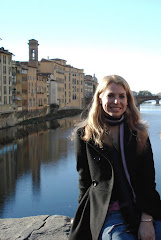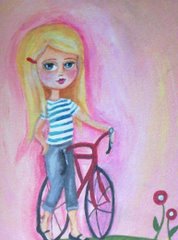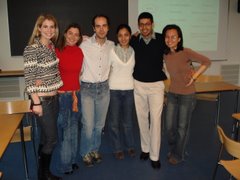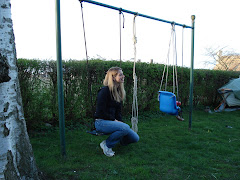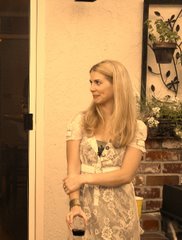 Coeur d'Alene, Idaho... June 25, 2006
Coeur d'Alene, Idaho... June 25, 2006Background
The fact that I race triathlons takes some getting used to. It ranks up there with flying saucers, a French victory, and Martha Stewart's soul in the category of Things You'd Never Expect to See. I join you in your shock. For nearly five years now, I've fancied myself a poser triathlete. I dabble in the sport. I wear pink running skirts when I train and waterproof mascara during open water swims. Triathlon is my hobby; one that consumes 5, 10…. maybe 15 to 17 (tops) weekly hours of my life in training.
But I do it for fun, and certainly not very fast. After racing in 4 half-ironman triathlons and seeing steady improvement in my training, my splits and my race-day outfits, I decided it was time to step up the challenge.
One year ago, in an altered state of mind — with the scars of a heartache wearing on my thin ego — I registered for Ironman Coeur d'Alene in Idaho, one of five North American full-distance triathlons that leads up to the penultimate race: Ironman Kona in Hawaii.
2.4 mile swim, 112 mile bike, 26.2 mile run. Piece of cake.
My race preparation was fantastic. Though a large investment of my time, money and patience, I began training in earnest 9-months out from the event. I trained alone, I trained with friends, I trained with my father, and I trained with legends. In October, I ran loops around Hamlet's mythic castle in Denmark. In November, I received cycling advice from a man who won the Tour de France. I later met Ronnie Lott ("who are you?" I asked in a red-wine haze), and he flattered me with a compliment about my discipline. By February, I had successfully beaten my ex's skinny new girlfriend in a local half marathon. And by March, my boss Arnold had told me I trained too much: "You need to vork more."
Though fatigued at times, I felt fit and healthy during the weeks leading up to the race. My body grew stronger and unexpectedly thicker in places I never expected muscles to hide. By May, I had gained enough weight to alarm my haphazard doctor who suggested I "start working out."

With the person who taught me everything I know. And my mom.
I arrived to Coeur d'Alene as prepared as I could be. With a small army of supporters — Mom, Dad, two of my three sisters, Christy and Allyson, and our dog Arlo — we descended on Lake Coeur d'Alene Resort in the lush Pacific Northwest. I did a mental checklist of the pre-race rituals that often concern triathletes (carbo-load, stretch, hydrate), and dismissed all those things in favor of my usual pre-race agenda (bikini wax, pedicure, and sports massage by man named "Thor").
Race day arrived on Sunday, June 25th, and my family members surprised me by wearing matching t-shirts emblazoned with a frightening image of my face. "You make us proud!" was written beneath my mug. Their willingness to compromise all sense of fashion and dignity — wearing shirts silk-screened at a mall kiosk — gave me a surge of motivation. They were there entirely for me, wholeheartedly and unfashionably, and I would recruit every fiber in my body to help get me to the finish line for them.

Volunteers body-marking me before the race. Braids are back!
The Swim ~ 3.8 km
When the gun went off, I entered the lake hand-in-hand with my training partners, Penny and Alene. It was a mass start, and 1,500 bodies were flung far and wide throughout the shore as we charged toward a bottleneck turn more than a mile away.
I was scratched, pummeled, tickled, and kicked in the face; it was like another day at work for Naomi Campbell's assistant. I emerged from the icy water in 1 hour, 15 minutes, approximately 15 minutes faster than expected. A 2-inch cut at the base of my neck trickled drops of blood, which was of little concern to me once I spotted my sisters cheering for me against a screen of spectators on the beach. I felt great.

I'm bringing sexy back.
The Bike ~ 180 km
I hopped on my blue, carbon-fiber Orbea and began my ritualistic positive thinking: "This is going to be a great day!" "I'm going to feel terrific on this 112-mile bike ride!" Spinning my legs, I absorbed the gorgeous surroundings and carefully repeated my father's race-day mantra, which he had reminded me minutes before the start. "Slow and steady wins the day." When I started racing a while back, my coach Gina summed up triathlon as an event in which the primarily goal is to delay fatigue. Going too hard in the beginning is a sure-fire way to invite fatigue into the party.
At mile 30, with the mercury slowly rising and my legs rebelling in kind, my thoughts went downward. "This is starting to hurt a little! But it's not so bad!" Just a few thousand athletes passing me! At mile 50, with the temperature hovering at 98 degrees, I unraveled. "Positive thinking, my ass! This was the worst idea I have ever had, since the time I permed my bangs in seventh grade." Who do I think I am?
My thoughts turned to all the people who I had told about the race. I had a Homer Simpson moment. Doi!?!? I worried I'd be telling them all I failed.
My slow-speed come-apart reached a fever pitch at mile 75 as I crested the last steep climb of the day. A few meters in front of me, I spotted several of my training partners: LeAnn, Laura, JoAnne and Diane. All experienced Ironwomen, I often sucked on their wheels during training rides. I was shocked to have caught up with them. They too were struggling, even more than me. LeAnn had heat exhaustion, JoAnne looked slightly delirious, and my friend Diane looked like an angry lady. LeAnn is a chirpy, 35-year-old knockout who suffered a serious stroke a mere 14 months ago. This race was her comeback. She flashed me a determined smile.
"Camryn!!! Join the party! It's 100 degrees out here, but we're going to survive, we're going to have fun, and we're going to get through this bike ride."

Swollen, dehydrated and poker-faced.
My morale came back. We were all hurting, but at least we could suffer together. I learned in that moment that the collective strength of friends can overpower the deepest sense of defeat. The remaining 37 miles our group kept each other in check; careful not to draft, we stayed within each others' eye-line—a force on the road determined not to be broken by the heat and the gusting 30-mph winds. From then on, I decided to take the race in stages. "Just get to the next water station, just get through the bike." In such a long endurance event, it's helpful to set up mini-milestones to break up the monotony of the pain.
At the end of the 112 miles, I entered the Transition Area and spotted the ecstatic Christy, Allyson and my mom, smiling and waving. My dad looked like a determined paparazzo, snapping photos while hovering over the barricade that separated the spectators from the athletes. I felt a bit tired, but I gave them a thumbs up and smile to help ease any tension in case they were worried. It felt like heaven getting off of that damn bike. I remember thinking, as I literally threw my beloved Orbea on the grass, "I never want to ride that thing again." I entered the Women's Transition & Changing Tent with my training friends, where we were greeted by kind volunteers who covered us with cool, wet rags to wipe off the salt caked on our bodies.
I guzzled more Cytomax sports drink, grabbed my Cliff Blocks, and threw on my running shoes and hat. I felt the blood return to my legs. I had officially bounced back from the dreaded bonk I had experienced on the bike!
I felt renewed and ready to tackle the marathon. Receiving the warms cheers of friends and loved ones during an event like Ironman is the most invigorating stimulant an athlete can ever hope to experience.
The Run ~ 42.2 km
I took off jogging. After a mile or so, I realized my legs were shredded, so my jog became a shuffle; the Ironman Shuffle is its clinical term. Faster than a lumbering senior citizen, slower than a charging toddler, the Ironman Shuffle is the dramatic enactment of an athlete dragging her feet, slumping her shoulders and pressing forward in a lateral motion. Anything but walking or stopping.
I formulated my mini-milestones. "Run until the next aid station." Every mile to mile-and-a-half featured one, where I would walk, drink and take in calories while passing through. At mile 13, I changed the rules. I decided once I spotted an aid station I could slow the run into a shuffle or walk, while resuming running after passing through.

To kill time, I started "Ironman dating." I had a relationship with a charming blonde guy who passed me at mile 13. I was struggling, but I didn't let him out of my sight. We leap-frogged back and forth. Despite some awkward moments, he was a confident and tan companion. He broke up with me for good at mile 16 when some floozy in red spandex got between us.
Then, a cute Brazilian boy with muscular calves stole my heart. But we had trouble communicating, and I had to dump him when he slowed down, due to what I assumed to be "issues" in his gut.
At mile 17, I began passing people. Men, women, people older, and people much younger. I ran for several miles with a Canadian woman who sipped soda "pop" and a hot-shot L.A. attorney who lifted my spirits when he bragged that he usually finished Ironman races in 11 hours. We had missed that mark a couple hours back. The three of us became a happy, dysfunctional family, sharing stories, laughs and encouragement. We waited for each other, and pushed each other up the gently rolling hills.
At mile 20, I was ready to be done racing and realized the quickest way to achieve that goal was to increase my pace. I bid farewell to my buddies and took off down the road. At mile 24.5, my legs were throbbing. It was after 10 PM at this point, and I had been racing for more than 15 hours. The stars were bright as I lifted my head up to the cobalt sky for the first time all day. There was an athlete a hundred yards in front of me, and another runner even further behind. I found myself alone on the course, nestled in a stretch of Coeur d'Alene resort homes jutting up to the lake. The stars dotted the sky, effusing a light glow on the dark roads and the runners scattered below.
In that solitary moment, a feeling I'd relate to homesickness washed over me. My thoughts turned to all the people who I loved and missed. The people who couldn't be there to witness the event, and the figures in my life who had passed on. I thought of old childhood friends whose time had expired prematurely: Kenny, Krissy and Kate.
I ran for them. And I felt them running with me. I thought of my Nana, the dearest of my ancestors, who understood her quirky granddaughter like no other soul could. I ran for her. Not one for existential moments, I often avoid the cheesy spins on life in favor of truth and logic.
But in that moment I was too fragile and tired to fight it. I sunk into the pain, and thanked my silent soldiers above for sticking with me throughout the day.
The pain evaporated, and I ran like the wind toward the finish line.
The last half-mile stretch runners course through the finisher's chute. Thousands of spectators lined it, screaming my name and race number against the blare of a rock song that pounded a rhythm for the crowd.
To call it exhilarating would be like calling the universe big. I remained focused, firm and joyful as I crossed the finish line. Gratitude overwhelmed my emotions.
The announcer roared on the loud-speaker — against the cacophony of music — "Camryn Thomas, you are an Ironman." He was only half right. I was the Ironman, but so many people had a hand in my finish. I felt unworthy of the credit I was receiving, from the catchers who greeted me, to the spectators clapping uproariously. My shaking hands covered my face as I fell into the arms of my crying mom.
Looking back, I'm tempted to recite the standard Ironman finishers' refrain: "The race changed me." Or "best experience of my life."
But neither is true for me, and such statements are too dramatic. It didn't change my life. It was just another day; one that began at sunrise and ended with a slice of pizza and a bathtub filled with ice.
But it was a day of excitement, pain, agony, suspense and joy. It was an event that put my faith on trial, and in the process restored my belief in myself, and in something else… much stronger than me.

